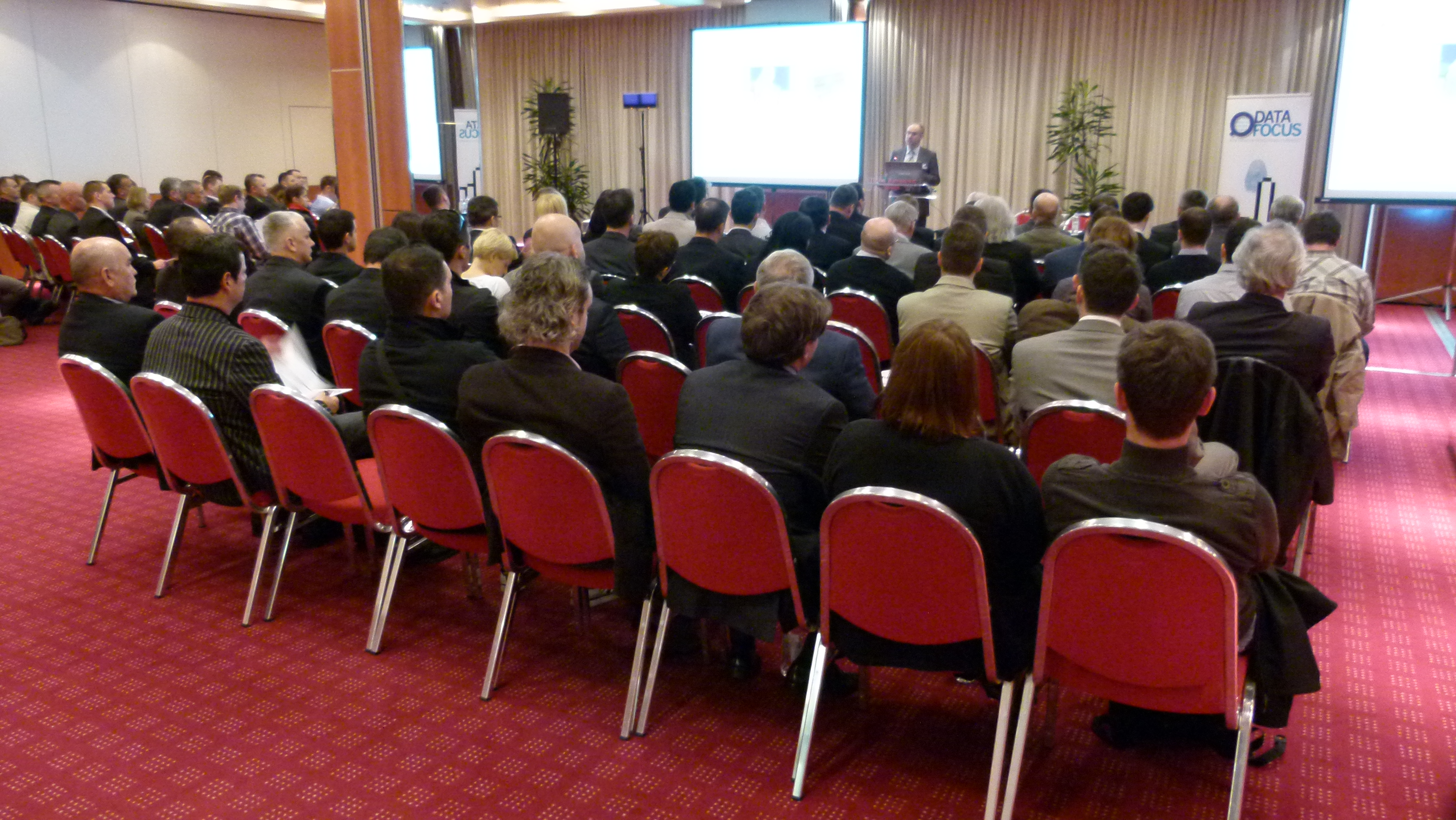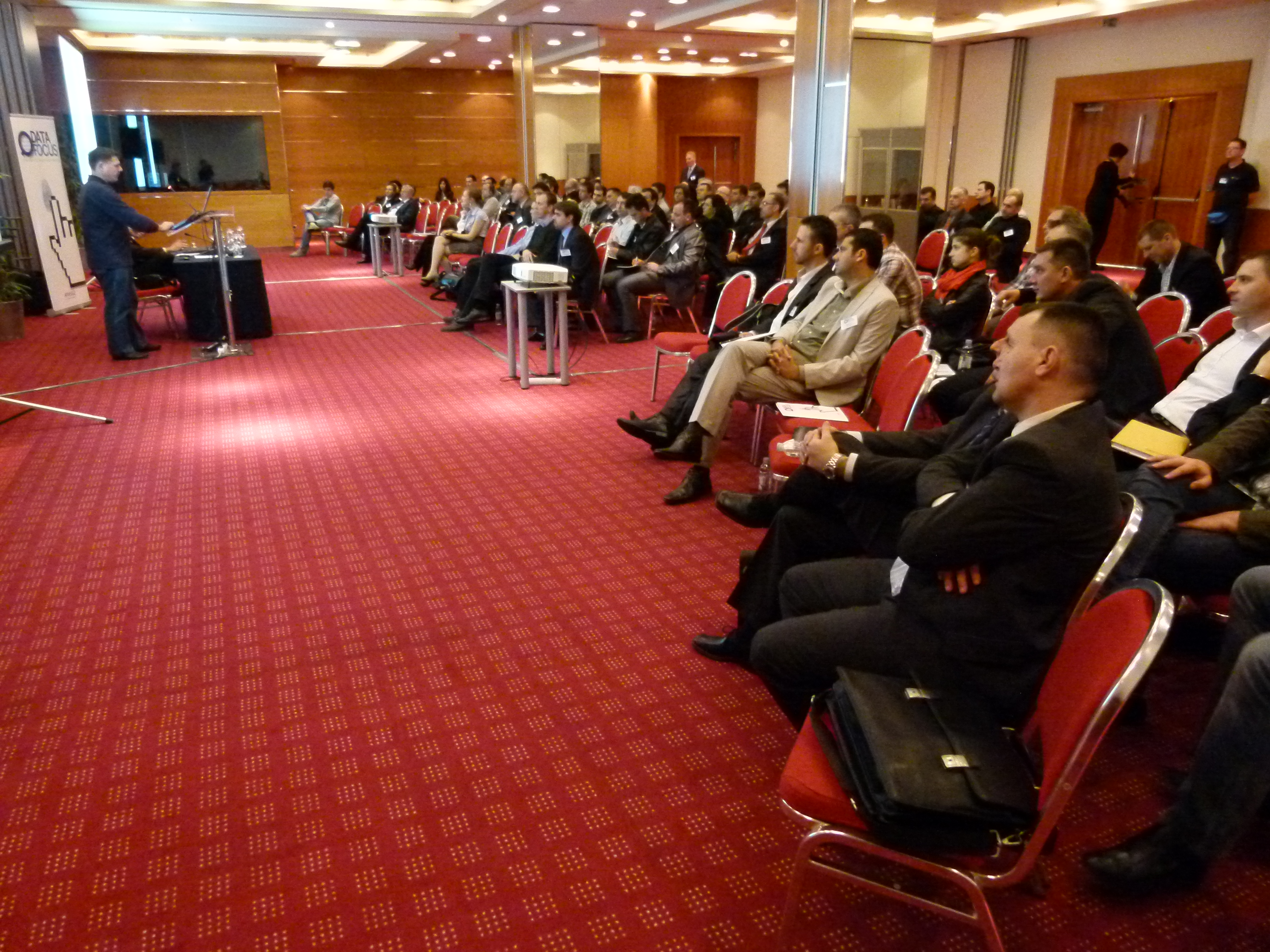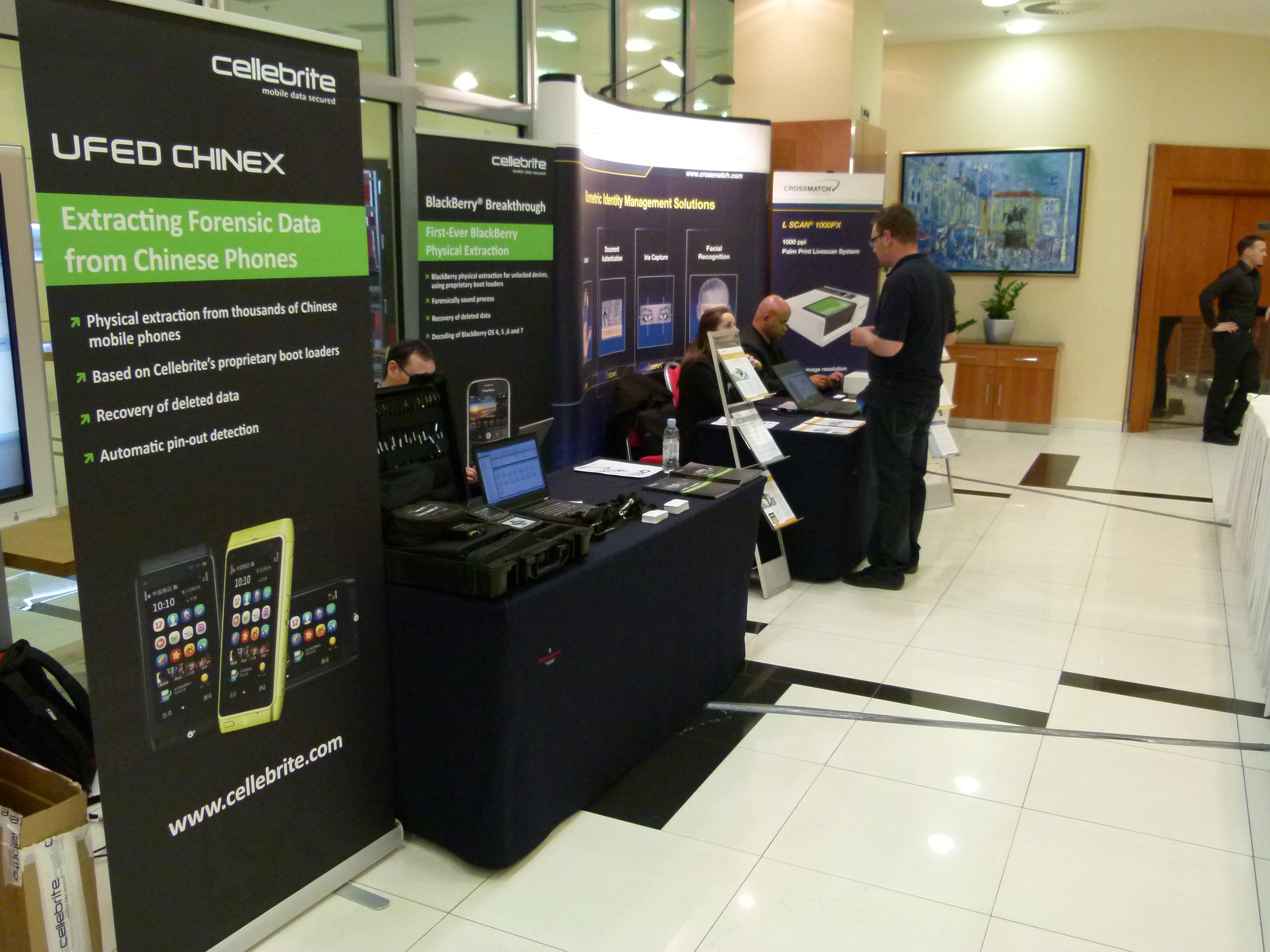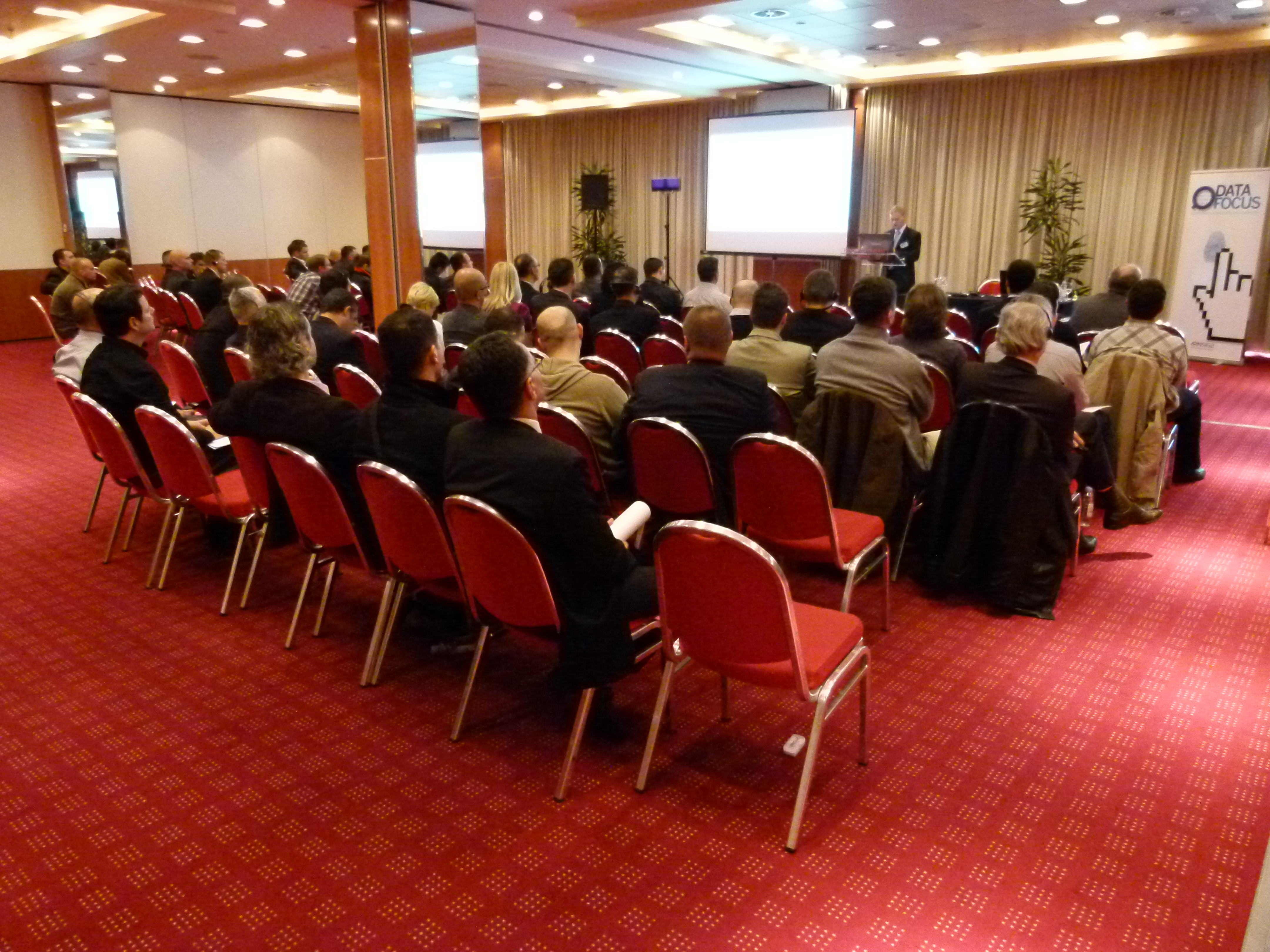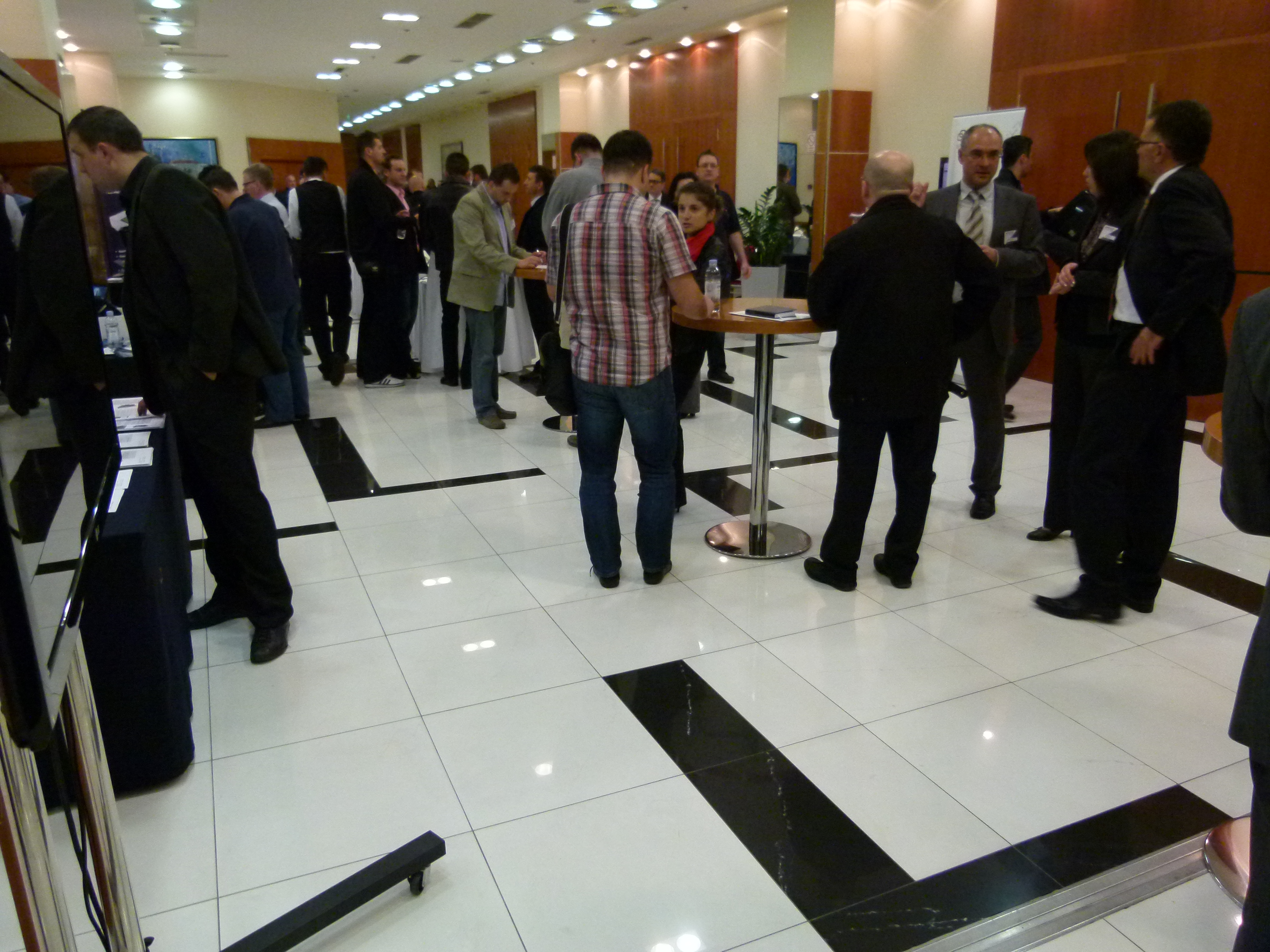InfoZoom can almost immediately identify complex correlations in large data sets. Such a unique approach compiles all data on a single computer screen – without the need for time-consuming preparation and complex programming. A single mouse click can get you a clear overview of different types of content and their distribution.
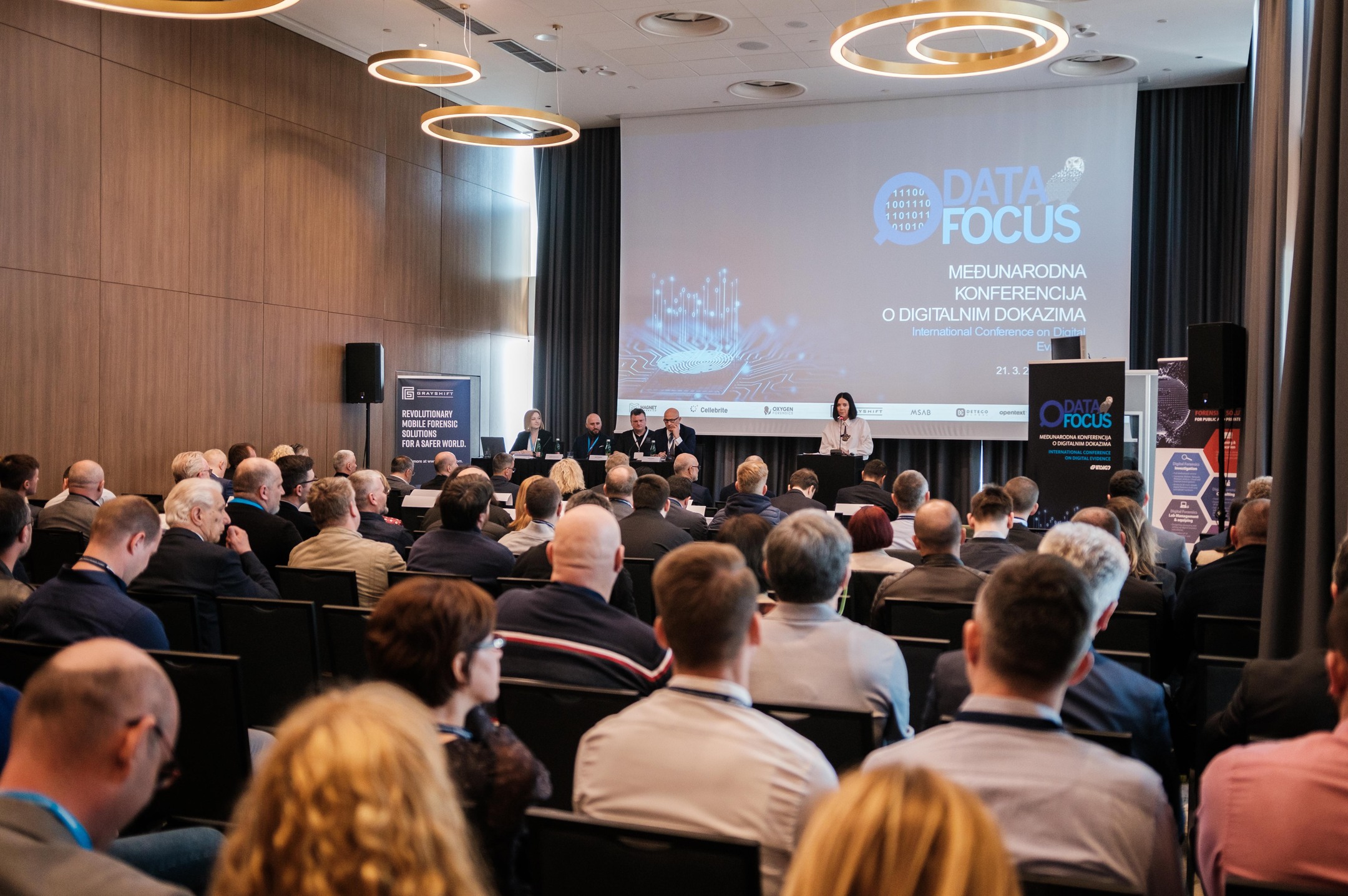
DataFocus 2012
9th of April | Hotel Antunović, Zagreb, Hrvatska
DataFocus is all about exchanging experiences
We bring together law enforcement investigators, prosecutors, judges, court expert witnesses, and other experts, and let them talk about their experiences with digital evidence and digital forensic investigations.
Since 2012
Every year
Entrance
DataFocus conference is divided into several sections
Explore distinct sections offering insights into technical facets of evidence handling, showcase the latest products and services, and participate in interactive workshops.
Investigation section
Lecturers address technical aspects of finding, preserving, and processing digital evidence and the legal presentation of digital evidence in criminal and administrative proceedings.
Technical section
Experts provide lectures showcasing and demonstrating the latest products, services, and trends in the digital forensic field.
Workshops
At the event, our partners will conduct a series of workshops, providing participants with opportunities for personalized inquiries and live demonstrations.
Agenda
Agenda
9:00 - 9:20
Opening ceremony (Tomislav hall) Goran Oparnica, BSc, INsig2 d.o.o. Dragan Novosel, LLM, First Deputy Attorney General of the Republic of Croatia Evelin Tonković, LLM, Deputy Minister of the Interior of the Republic of Croatia
Zoran Šprajc
Ceremony hostInvestigation section
Hall Tomislav
9:20 – 10:00
Keynote presentations (Tomislav hall) Lawful Interception of Electronic Communication
Prof. Ph.D. Krunoslav Antoliš
Ph.D., Police Academy Zagreb, CroatiaInvestigation section
Hall Tomislav
9:20 - 10:00
Keynote presentations (Tomislav hall) Lawful Interception of Electronic Communication
The lawful interception of electronic communication primarily refers to the formation of legal basis and ensuring compliance with requisites and prerequisites for such procedures prescribed by law. The applicable legal regulations give security intelligence agencies and the police the opportunity to, upon due order issued by competent court, intercept electronic communication for the purpose of data collection by applying secret data collection measures and special evidence collection activities. To discuss the matter in hand, it is necessary to clearly define situations in which the police have the right to undertake special evidence collection activities, for which intelligence agencies may apply secret data collection measures. As the civil society seeks to protect fundamental rights and freedoms of all citizens guaranteed by the Constitution, the system of comprehensive supervision and the application of secret data collection measures / special evidence collection actions are nowadays often scrutinized.
Lecturer:
Prof. Ph.D. Krunoslav Antoliš
Ph.D., Police Academy Zagreb, Croatia
9:20 - 10:00
Keynote presentation: Digital Footprint
Mr. Sc. Predrag Pale
Faculty of Electrical Engineering and ComputingInvestigation section
Hall Tomislav
10:15 - 10:45
Role of the Ministry of the Interior of the Republic of Serbia in Combating High-Tech Crime and Experiences from Practice
Mikailo Tijanić
MSc, Ministry of the Interior of the Republic of Serbia, Chief of Prevention of Intellectual Property Crime Sector, Serbia10:15 - 10:45
Role of the Ministry of the Interior of the Republic of Serbia in Combating High-Tech Crime and Experiences from Practice
The main routes of transporting falsified goods go from Bulgaria, Turkey and Kosovo to the western borders of Serbia, Bosnia and Herzegovina and Croatia, and to the north, towards Hungary. In October 2010, the Serbian Ministry of the Interior intercepted a chain of smuggling textiles and footwear of well-known brands. The total value of seized copyrighted goods amounted to € 600,000. The goods were intended for sale on the Western European market and included the following world-renowned brands: “Boss”, “Armani”, “Paul and Shark”, “Burberry”, “Nike”, “Reebok”, “Tom Tailor”, “Pierre Cardin”, “Tommy Hilfiger”, “Next”, “D&G”, “Pepe Jeans”, “Versace” and so on. In his lecture, Mr. Tijanić will share his considerable experience gained while working with the Ministry of the Interior of the Republic of Serbia.
Lecturer:
Mikailo Tijanić
MSc, Ministry of the Interior of the Republic of Serbia, Chief of Prevention of Intellectual Property Crime Sector, Serbia
Mikailo Tijanić is the Head of the Intellectual Property Office with the Ministry of the Interior of the Republic of Serbia. His duties include cooperation with other state institutions, private organizations involved in intellectual property protection, and copyright holders who turn to the Ministry of the Interior in cases of violation of their rights.
10:40 – 11:15
Are we Ready for Cloud Forensics?
Primož Kragelj
Ministry of the Interior of the Republic of Slovenia, Senior IT Forensic Expert, Forensic Department, Slovenia10:40 - 11:15
Are we Ready for Cloud Forensics?
Cloud computing is all the rage in the area of IT infrastructure. With a wide range of new possible cases, it poses a challenge to both digital forensics and legal professionals. The majority of related academic and real-life issues deal with the storage of data and ways of tracing such data back to an individual. From a business standpoint, there is an interesting range of available services and attractive payment methods. In this lecture, we will discuss some of these issues based on examples from actual cases.
Lecturer:
Primož Kragelj
Ministry of the Interior of the Republic of Slovenia, Senior IT Forensic Expert, Forensic Department, Slovenia
Primož Kragelj can boast of great knowledge in the IT field he has acquired throughout more than 10 years of professional experience. During this time he has gained expertise in software and IT infrastructure development, various operating systems and networking, as well as quality, project, and resource management. He joined the police in June 2010 and focused on computer forensics. At the same time, he enrolled in a postgraduate study program in cloud forensics at the Jožef Stefan Institute.
11:15 - 11:45
Mobile Device Forensics, with an Emphasis on GPS Navigation Devices
Damir Delija
Consultant, INsig2, CroatiaFilip Baričević
Student, Croatia11:15 - 11:45
Mobile Device Forensics, with an Emphasis on GPS Navigation Devices
The term mobile device, in addition to mobile phones, today serves to describe a wide range of other devices such as readers, tablets, players and navigational GPS devices. Though the same basic principles of digital forensics apply to all mobile devices, specialized knowledge and procedures are required to deal with particular types of mobile devices. The lecture will provide a general overview of digital mobile device forensics and explain GPS-specific procedures.
Lecturers:
Damir Delija
Consultant, INsig2, Croatia
Damir Delija currently works as a consultant for EnCase Enterprise and related computer forensics tools at Insig2. He received his PhD in Computing, with emphasis on the control and management of computer networks and systems, at the Faculty of Electrical Engineering and Computing, University of Zagreb, in 1998. He has been working in the field of security and administration of computer networks and systems since 1990.
Filip Baričević
Student, Croatia
Filip Baričević is an information technology engineer, born in Zagreb, in 1987. He is currently attending the Zagreb College for Information Technologies and spends his spare time working as an assistant coach at the Euro-Tera Karate Club.
11:45 - 12:15
EnCase Portable – Exclusion of Digital Evidence at Crime Scene
Stephen Gregory
Guidance Software, United Kingdom11:45 - 12:15
EnCase Portable – Exclusion of Digital Evidence at Crime Scene
The lecture will discuss the manner of digital evidence triage, examination, and collection by using EnCase Portable and Tableau products at the crime scene.
Lecturer:
Stephen Gregory
Guidance Software, United Kingdom
Stephen Gregory is a police veteran with 22 years of experience in the UK. During his 9 years with Guidance Software, he worked in 3 different departments and gained vast experience, from forensics and marketing to management. He is familiar with all Guidance Software products and is actively involved in communication with clients who use or conduct training for their solutions. He is currently working as a forensic technical manager at the Forensic Business Unit in charge of promoting EnCase Forensic and Tableau products in the EMEA region.
12:15 - 13:15
Lunch
13:15 - 13:45
Digital Forensics Knowledge Catalogue
Damir Delija
Consultant, INsig2, Croatia13:45 - 14:15
Info Zoom – Understanding Large Amounts of Data
Ingo Lenzen
humanIT, Germany13:45 - 14:15
Info Zoom – Understanding Large Amounts of Data
Ingo Lenzen
14:15 - 14:45
Forensic Workstations
Johannes Seitz
mh-Service, Germany14:45 - 15:00
Coffee break
15:00 - 15:30
AccessData Through the Years
Faisal Habib
AccessData, Germany15:30 - 16:00
UFED – Efficient Mobile Device Examination Tool
Yuval Ben-Moshe
Cellebrite, Israel15:30 - 16:00
UFED – Efficient Mobile Device Examination Tool
The rapid development of the mobile market, with new products and software solutions being developed daily, poses a new challenge facing the forensic community that must keep pace. In this lecture, we will go through some of the key technological challenges and some of the more innovative and monumental methods of dealing with such challenges implemented in the Cellebrite UFED series.
Lecturer:
Yuval Ben-Moshe
Cellebrite, Israel
Yuval Ben-Moshe has more than 20 years of experience in the area of modern mobile and data communication. As Cellebrite’s forensic technical director, Ben-Moshe is the company’s expert in this area in charge of making sure that their products maintain the leading position as the world’s best and most viable solutions for mobile forensics.
16:00 - 16:30
Lawful Interception of Data and National Security
Thilina Manana
Ondata, Spain16:00 - 16:30
Lawful Interception of Data and National Security
National security is the most important topic for the majority of the world’s governments. National security service officers traditionally conduct investigations by tracking suspects, collecting physical evidence, intercepting calls, etc. However, the majority of crimes are nowadays committed anonymously, using high-tech solutions such as encrypted broadband communication, SMS messages, online social network services, etc. These types of crimes are very difficult to detect without heavy high-tech equipment. E-Detective is a forensic monitoring system that captures, decodes and reconstructs various types of internet traffic in real-time, in accordance with ETSI, SOX, HIPAA, GLBC, ISO 270001, and SEC regulations. It is generally used for the surveillance of online activity, behavior, and organizations, data storage, forensic analysis, and investigation, as well as the means of legal interception by supervisory organizations such as police, military, national security agencies, anti-terrorist agencies, etc.
Lecturer:
Thilina Manana
Ondata, Spain
Thilina Manana is a regional manager and consultant at Ondata International. Prior to joining Ondata International, he worked at British giants Scottish & Southern Energy PLC and S&N Seasoning Ltd. Thilina holds a First Class Honours Bachelor’s Degree in Computer Science and Information Systems from the University of Portsmouth and a National Diploma in Network Engineering and Telecommunication Systems.
10:15 - 10:45
What Lawyers Need to Know About Digital Evidence
Asst.Prof.Ph.D. Liljana Selinšek
Commission for the Prevention of Corruption of the Republic of Slovenia, Slovenia10:15 - 10:45
What Lawyers Need to Know About Digital Evidence
Digital evidence is, first and foremost, evidence just like any other, and therefore subject to the same basic rules that apply to all other types of evidence. However, it must be acknowledged that digital evidence is different in nature. The suspect’s presence at the crime scene can be confirmed, for example, by DNA analysis or by finding his wallet and documents. Even though both of these types of evidence represent a valuable source of information, there are significant differences between them arising from the manner of their collection, storage, analysis and evaluation. Just as DNA analysis represented the big unknown at the beginning of its development, so was the digital forensics cloaked in obscurity at the beginning of its era. But unlike DNA analysis, which relatively quickly became generally accepted and an indisputable means of evidence in criminal proceedings, digital forensics still has a tough road ahead of it. It is much easier to understand the fact that the human body leaves biological traces, than the fact that the use of digital devices leaves digital traces. Blood, saliva and hair are everyday and familiar terms, whereas the bit, the byte, metadata, and algorithms are as far from familiar as it gets. The use of digital evidence in court proceedings therefore depends on the ability to understand the nature of such evidence, which requires specific knowledge of digital evidence and digital forensics, as a method or means of digital evidence collection, storage, analysis, and so forth. Understanding the nature and attributes of digital evidence, as well as the limitations of digital forensics, is not necessary only for the regularity of legal proceedings, but also for the successful cooperation between legal professionals (judges, investigators, state prosecutors, lawyers) and forensic experts. It is therefore imperative that legal professionals acquire certain knowledge of digital evidence and forensics. The speaker will, in the lecture, focus on individuals working in the broader sphere of criminal justice and present basic topics that are important for the proper use of digital forensic results in pre-trial and criminal proceedings.
Lecturer:
Liljana Selinšek
Ph.D., Commission for the Prevention of Corruption of the Republic of Slovenia, Slovenia
Liljana Selinšek was awarded the academic title of Doctor of Juridical Science at the Faculty of Law, University of Maribor, in 2002. She, thereafter, passed the state bar exam. Her entire academic and, later, business career was focused on criminal law, first while working as a teaching assistant, and later as an assistant professor at the Faculty of Law, University of Maribor. Upon leaving the academic sphere, she was, for a short while, employed as a consultant at the office of the Commissioner for Access to Public Information. On 1 January 2011, she was appointed the Deputy President of the Commission for the Prevention of Corruption. Her bibliography, which counts more than 150 titles, primarily consists of scientific and professional papers and other works in the wider area of criminal law and offenses.
10:45 - 11:15
Cybercrime in New Croatian Criminal Code
Ph.D. Stjepan Gluščić
Police Academy Zagreb, Croatia10:45 - 11:15
Cybercrime in New Croatian Criminal Code
The Convention on Cybercrime of the Council of Europe today represents the European standard in the area of cybercrime protection. The adoption of the new Croatian Criminal Code, which should enter into force in 2013, should clarify all doubts arising from obligations prescribed by the Convention in the Republic of Croatia. Many point out that the normative state is already fully in line with the Convention. But is this the ultimate reach of the state for the protection in this area or can we expect further action? This question can be easily answered taking into account that the area of computer technology today represents the most dynamic area of life. Since the aforementioned act has not yet entered into force, the Anti-Counterfeiting Trade Agreement (ACTA) for some represents a particular concern, while for others an invitation to welcome more proposals. Regardless of the fact that ACTA is not directly backed by any international organisation, it is believed that future activities related to its development may provoke dissatisfaction and even open expression of violence. Will ACTA-related activities, even if ACTA is not adopted in the current form, demand further activity given prescribing prohibited behavior in the area of cybercrime? That is the burning question. The purpose of the lecture is to give an overview of the newly adopted Criminal Code given the normative framework regarding cybercrime and circumstances prescribing the punishable behavior in the area of computer technology.
Lecturer:
Stjepan Gluščić
Police Academy Zagreb, Croatia
Stjepan Gluščić is a professor at the Zagreb Police College, where he teaches courses in criminal procedural law. He has published numerous professional and scientific papers, participated in the drafting of various legal regulations and cooperated with a great number of Croatian and international institutions.
11:15 - 11:45
Collection of Electronic (Digital) Evidence for Criminal Proceedings
Ph.D. Elizabeta Ivičević Karas
Faculty of Law, CroatiaMr. Sc. Marin Bonačić
Faculty of Law, Croatia11:15 - 11:45
Collection of Electronic (Digital) Evidence for Criminal Proceedings
The recent development of cybertechnology is also observed in the area of criminal law. On the one hand, we are now dealing with new offenses in the area of cybercrime but, on the other hand, it is now possible to commit other criminal offenses using computer systems. Moreover, cyber technology has also made possible the storage of information on committed criminal offenses in electronic (digital) form, which can lead to their detection and investigation. The subject of this lecture is the collection of evidence in electronic (digital) form for the purpose of criminal proceedings. This activity, by its definition, differs from the preventive collection of computer data by the police and security services. Following the development of technology, the Criminal Procedure Act now provides for the use of data in electronic (digital) form as evidence and prescribes the manner of their collection. The implementation of related measures may be seen as a significant limitation of fundamental civil rights and freedoms, in particular the right to respect for one’s private and family life, the right to freedom and secrecy of correspondence and other forms of communication, and the right to security and confidentiality of personal data. The lecture will discuss the legal regulation of measures for the collection of electronic evidence. We will also consider the extent to which Croatian legislation complies with the principles and recommendations contained in Recommendation No. R(95)13 and fulfills convention obligations prescribed by the Convention on Cybercrime. In addition, we will compare the existing Croatian regulatory framework with the judiciary of the European Court of Human Rights concerning the legality of electronic evidence collection and draw a comparison with solutions from other countries.
Lecturers:
Elizabeta Ivičević Karas
Faculty of Law, Croatia
Elizabeta Ivičević Karas received her Ph.D. from the Université Panthéon-Assas (Paris II) and the University of Zagreb upon completing her doctoral dissertation titled “The Principle of Equality of Arms in Criminal Matters in the Jurisprudence of the European Court of Human Rights and in Comparative Law”. She passed the state bar exam in 2009. Currently, she is the leader of the scientific project “Reform of Croatian Economic Criminal Law” launched by the Croatian Ministry of Science, Education and Sports and the development project “Judgements of the European Court of Human Rights in Criminal Cases against the Republic of Croatia” launched by the University of Zagreb. In addition, she is an associate in the scientific project “Contemporary Criminal Procedure in the Republic of Croatia and Europe”, led by Prof. Davor Krapac, Ph.D. As an associate, she also contributed to the scientific projects “Criminal and Legal Aspects of the Accession of the Republic of Croatia to the European Union”, led by Prof. Zlata Đurđević, Ph.D., and “Croatia and International Criminal Justice” led by the Chief Investigator, prof. Ivo Josipović, Ph.D. She is a member of the Croatian Association of Criminal Sciences and Practice and the Croatian Association of European Criminal Law. Furthermore, she has published two books and a number of scientific and professional papers.
Marin Bonačić
Faculty of Law, Croatia
Marin Bonačić was employed as a junior researcher at the Faculty of Law, University of Zagreb, where he participated in the scientific research project “Croatia and International Criminal Justice”. Since March 2009, he has worked as a teaching assistant at the Department of Criminal Law with the Faculty of Law, University of Zagreb. He teaches criminal procedural law, misdemeanor law, and criminology within the integrated university-level study program, and the course Basics of Criminal and Misdemeanour Law offered by the Study Centre for Public Administration and Public Finance Law within the Faculty of Law. In 2010 and 2011 he acted as the local leader of the international project “Documenting the Past of Croatia: Establishment of a Digital Database on War Crimes”, sponsored by the Kingdom of The Netherlands Ministry of Foreign Affairs MATRA Programme and the Croatian Ministry of Science, Education, and Sport. As an associate, he also contributed to the scientific projects “Criminal and Legal Aspects of the Accession of the Republic of Croatia to the European Union”, led by Prof. Zlata Đurđević, Ph.D., and “Judgements of the European Court of Human Rights in Criminal Cases against the Republic of Croatia” led by asst. prof. Elizabeta Ivičević Karas, PhD. He previously participated in the scientific project “Croatia and International Criminal Justice” led by Prof. Ivo Josipović, Ph.D. He is a member of the Croatian Association of Criminal Sciences and Practice, the Croatian Association of European Criminal Law, and l’Association Internationale de Droit penal (AIDP). In addition, he authored numerous professional papers and presentations and collaborated on a book project (currently in the process of publication).
11:45 - 12:15
Digital Forensics and Privacy
Prof. Ph.D. Miroslav Bača
Faculty of Organization and Informatics Varaždin, Croatia11:45 - 12:15
Digital Forensics and Privacy
Both the charge itself and the right to privacy represent a new challenge to digital evidence investigators when gathering digital evidence within the investigative activity. Must a person being investigated provide a password for his or her computer, account, or file, without which the exclusion and gathering of digital evidence sometimes is not possible? How do we interpret data that the user “deleted” from his or her computer and may such data being retrieved, whose metadata are lost, be taken into account during the investigation? What about private data collected on a person (whether such a person is or is not a suspect) and private data regarding other persons found during the gathering and exclusion of digital evidence? There are still many unanswered questions. This lecture will touch on some of these issues and offer several possible solutions, based both on the EU legislation and considerable professional and expert experience.
Lecturer:
Miroslav Bača
Faculty of Organization and Informatics Varaždin, Croatia
Miroslav Bača is a full professor at the Faculty of Organization and Informatics in Varaždin, University of Zagreb, where he teaches courses in the abuse and security of information systems and biometrics. He is the President of the Committee on the Specialised Postgraduate Study Programme in Information Systems Security and Auditing Management at the Faculty of Organization and Informatics. In his current scientific and professional work, he primarily focuses on the protection and security of information systems, as well as the domains of computer forensics and digital evidence. In addition, he has so far written over 50 scientific and professional papers on this topic, as well as several books. He is a permanent court expert witness in biometry, informatics and telecommunications, and has, in such capacity, given several hundred different expert testimonies. Furthermore, he is a certified European Privacy Seal expert evaluator for IT products and IT-based services for the whole of EU.
13:15 - 14:45
Round table discussion: Digital Evidence in Criminal Procedure Acts of Countries in Region
Asst.Prof.Ph.D. Liljana Selinšek
Commission for the Prevention of Corruption of the Republic of Slovenia, SloveniaDragan Novosel
State's Attorney Office of the Republic of Croatia, CroatiaAleksandar Momčilović
State Attorney's Office of the Republic of Serbia, Serbia15:00 - 16:30
Round table discussion: Digital Evidence in Criminal Procedure Acts of Countries in Region
Asst.Prof.Ph.D. Liljana Selinšek
Commission for the Prevention of Corruption of the Republic of Slovenia, SloveniaDragan Novosel
State's Attorney Office of the Republic of Croatia, CroatiaAleksandar Momčilović
State Attorney's Office of the Republic of Serbia, SerbiaPlenary lecturers
Krunoslav Antoliš
Ph.D., Police Academy Zagreb, Croatia
Biography
Krunoslav Antoliš obtained a Graduate Degree in Maths and a Master’s Degree in Legal and Business Informatics. He was awarded a Doctor of Social Science Degree in Information Science in 1997. In his capacity as a college professor, he is currently performing the duty of the Head of Scientific Research at the Zagreb Police College. He is also the President of the Council for Civilian Oversight of Security and Intelligence Agency at the Croatian Parliament and the President of the Supervisory Board of the company AKD Zaštita d.o.o., owned by the Government of the Republic of Croatia. He has participated in fifteen scientific and fourteen specialist, domestic and international projects, either as the coordinator or a member. In addition, he has published over forty papers in foreign and domestic publications in the role of author or co-author, including three books in the area of information security. He participated as a speaker at over seventy international conferences in Croatia and abroad. As a university course leader and lecturer of, mainly, courses focused on information security, national security and the fight against terrorism, he acted as a mentor for numerous master’s and graduate theses at institutions where he worked as a professor. He is currently working as a university course leader and lecturer at the University Centre of Forensic Sciences with the University of Split, the Zagreb University of Applied Sciences and the Zagreb College of Applied Computing.
Lecture:
Lawful Interception of Electronic Communication
9:20 – 10:00, Hall Tomislav
All lecturers
Krunoslav Antoliš
Predrag Pale
Liljana Selinšek
Mikailo Tijanić
Stjepan Gluščić
Primož Kragelj
Elizabeta Ivičević Karas
Damir Delija
Filip Baričević
Marin Bonačić
Miroslav Bača
Stephen Gregory
Dragan Novosel
Aleksandar Momčilović
Ingo Lenzen
Faisal Habib
Yuval Ben-Moshe
Thilina Manana
Johannes Seitz

Hotel Antunović
Zagrebačka avenija 100a, 10090, Zagreb, Croatia
DataFocus Archive
DataFocus is an international conference on digital evidence that we have been successfully organizing since 2012.
see all